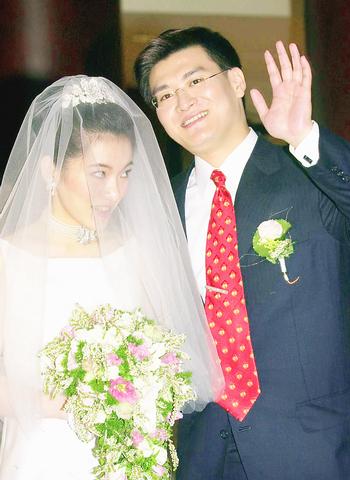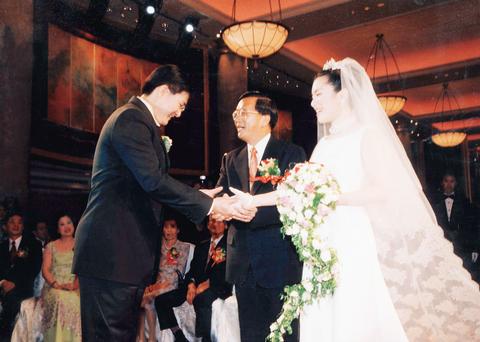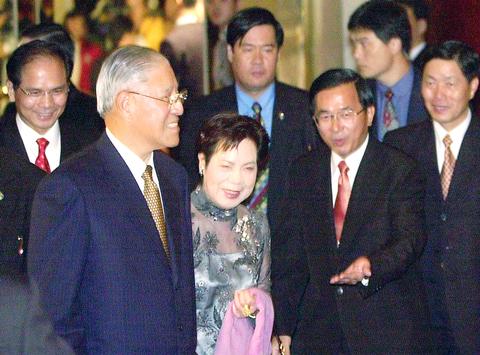President Chen Shui-bian's (陳水扁) daughter, Chen Hsing-yu (陳幸妤), took the plunge yesterday in a wedding that helped cheer up a nation recovering from two typhoons in as many weeks.
The event was a relatively unassuming affair, as the first family wished to keep it "simple, modest ... and just like a commoner's."
The wedding and banquet for Chen Hsing-yu and Chao Chien-ming (

PHOTO: CHIANG YING-YING, TAIPEI TIMES
The wedding ceremony began at 6:30pm when around 600 guests arrived at the hotel, including the heads of the five branches of government, Vice President Annette Lu (
President Chen took Hsing-yu on his arm and walked down the aisle as Chao waited on the stage.
Serving as the wedding witness, Judicial Yuan President Weng Yueh-sheng (

PHOTO: COURTESY OF THE PRESIDENTIAL OFFICE
Weng was the president's professor at National Taiwan University and was also the witness for the marriage of Chen and first lady Wu Shu-chen (
"I believe that President Chen and first lady Wu set a fine example for the newlywed couple, as they have taken care of each other all these years," Weng said during his speech at the wedding.
In his speech, Lee said that Chen and Wu had sacrificed what could have been ordinary lives to devote themselves to their country.

PHOTO: FANG PIN-CHAO, TAIPEI TIMES
"President Chen has consulted with me many times during the past month," Lee said, "and one of the major issues he once asked me about is how to be a good father-in-law. I think I am more experienced than he is on this issue."
After Lee and Chao Chien-ming's father gave their speeches, the president then expressed his appreciation to all guests and officials who helped to organize the wedding.
Chen said that Hsing-yu and Chien-ming should work hard just like other ordinary young people, and praised his wife for bringing the happy couple together.
"The thought of her daughter's wedding kept her motivated after going through such pain following the car accident 11 years ago," Chen said, referring to the politically-motivated accident which cost Wu the use of her legs.
Chen said that he had stepped into the political circle 21 years ago when Hsing-yu was just five years old and that it was his wife who should take all the credit for raising their daughter.
"This is the happiest moment for my wife," Chen said, "and the last dream for Shu-chen is to hold a grandchild in her arms."
Early yesterday morning, Chao and his companions went to the presidential residence to collect the bride and take her to the Mandarina Crown Hotel.
Through a steady drizzle, six rose-draped limousines arrived at the presidential residence at around 9:10am. Chen Chih-jung (
Chen told the couple at the residence: "A marriage reflects everyday life. It cannot be sunny everyday, and it will be stormy from time to time."
"On the stormy days ... they should support and care for one another. With more tolerance, care and understanding, there will be greater happiness and fulfillment."
After the family photo shoot, the president put down the veil for the bride and then the bride and groom bid farewell to the first couple.
The first lady then sprayed water from a bowl, a gesture that Hsin-yu was no longer the cherished child of her own family and must fulfill the duties of her new family.
The first couple was apparently very happy but also reluctant to part with their daughter. Both of them wished the newlyweds a happy life ahead.
Just before the limousines left the residence, the president picked up a camera and took photos of his daughter.
When the limousines arrived at the Mandarina Crown Hotel at 10:45am, they were greeted by a long string of firecrackers set off by the groom's family.
A boy from the groom's family greeted the bride with two apples in hand, symbolizing well-being, good fortune and sweetness.
After the newlyweds entered their bridal suite, the couple sat side by side on a couch with a pair of the groom's pants on it, which symbolized that the two will share their good times and bad times together. The groom unveiled his bride and kissed her.
The couple then fed each other sweet dumplings for a happy life ahead.
Despite widespread media coverage of the event, the Presidential Office kept a low profile and championed simplicity.
Because of the recent string of typhoons, many activities surrounding the wedding such as press interviews and news conferences were cancelled.
The president donated NT$1.5 million he had planned to give as his daughter's dowry, along with NT$500,000 of Hsin-yu's savings, to victims of Typhoon Nari.

Taiwan is projected to lose a working-age population of about 6.67 million people in two waves of retirement in the coming years, as the nation confronts accelerating demographic decline and a shortage of younger workers to take their place, the Ministry of the Interior said. Taiwan experienced its largest baby boom between 1958 and 1966, when the population grew by 3.78 million, followed by a second surge of 2.89 million between 1976 and 1982, ministry data showed. In 2023, the first of those baby boom generations — those born in the late 1950s and early 1960s — began to enter retirement, triggering

ECONOMIC BOOST: Should the more than 23 million people eligible for the NT$10,000 handouts spend them the same way as in 2023, GDP could rise 0.5 percent, an official said Universal cash handouts of NT$10,000 (US$330) are to be disbursed late next month at the earliest — including to permanent residents and foreign residents married to Taiwanese — pending legislative approval, the Ministry of Finance said yesterday. The Executive Yuan yesterday approved the Special Act for Strengthening Economic, Social and National Security Resilience in Response to International Circumstances (因應國際情勢強化經濟社會及民生國安韌性特別條例). The NT$550 billion special budget includes NT$236 billion for the cash handouts, plus an additional NT$20 billion set aside as reserve funds, expected to be used to support industries. Handouts might begin one month after the bill is promulgated and would be completed within

The National Development Council (NDC) yesterday unveiled details of new regulations that ease restrictions on foreigners working or living in Taiwan, as part of a bid to attract skilled workers from abroad. The regulations, which could go into effect in the first quarter of next year, stem from amendments to the Act for the Recruitment and Employment of Foreign Professionals (外國專業人才延攬及僱用法) passed by lawmakers on Aug. 29. Students categorized as “overseas compatriots” would be allowed to stay and work in Taiwan in the two years after their graduation without obtaining additional permits, doing away with the evaluation process that is currently required,

IMPORTANT BACKER: China seeks to expel US influence from the Indo-Pacific region and supplant Washington as the global leader, MAC Minister Chiu Chui-cheng said China is preparing for war to seize Taiwan, Mainland Affairs Council (MAC) Minister Chiu Chui-cheng (邱垂正) said in Washington on Friday, warning that Taiwan’s fall would trigger a regional “domino effect” endangering US security. In a speech titled “Maintaining the Peaceful and Stable Status Quo Across the Taiwan Strait is in Line with the Shared Interests of Taiwan and the United States,” Chiu said Taiwan’s strategic importance is “closely tied” to US interests. Geopolitically, Taiwan sits in a “core position” in the first island chain — an arc stretching from Japan, through Taiwan and the Philippines, to Borneo, which is shared by